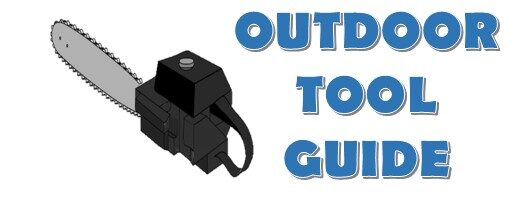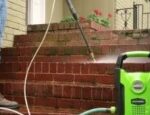As an Amazon Associate, this site earns commissions from qualifying purchases. For more information click here.
The best time to use a chainsaw is when the sun is out, but sometimes work needs to be done right away. If you need to cut wood and there is a downpour, can you still go out and cut? This post will show you that some chainsaws can be used in the rain, but there are things you need to consider carefully.
You can use a gas chainsaw in the rain as long as the engine is not submerged in water. Do not use electric chainsaws in wet conditions because water can lead to a short circuit or even electrocution.
What Chainsaw Can I Use in the Rain?
A gas chainsaw is the best – some will say only – one you can use in the rain. Sawdust will probably stick on the chain, but you can clean that off. Electric chainsaws should not be used in the rain because of the potential risk.
Battery or cordless chainsaws are not ideal in wet conditions either. They are safer than electric chainsaws in the rain but the risk of damaging the battery storage is there.
A light drizzle can easily turn into a downpour, which is why it is not a good idea to use electric or battery powered chainsaws in these conditions. To be on the safe side, you should check the weather before attempting any woodcutting.

How to Use a Gas Chainsaw in Wet Conditions
As long as you do not immerse the chainsaw in water, there should be no trouble. When you are done, clean the chainsaw and store it properly. This should be done whether it rains or not, but especially in a wet environment.
Gas chainsaws are built for heavy duty use and that includes sunny and rainy weather. Besides making sure the chainsaw is always above water, there are other things you can do to improve performance.
Keep the air filter clean. Chainsaw filters do a good job of keeping sawdust and other particles out. High humidity and rain however, causes the dust to stick and clog the filter.
This often happens during a sudden downpour. Your chainsaw is ripping through dry wood then it suddenly rains. The dust in the filters clogs up, affecting performance. Cleaning the filter will fix this.
Make sure the fuel tank is water free. Humidity is not a problem but you must never let water get into the fuel. Chainsaws require a specific mix to run and the presence of water will lead to problems.
When you are done, wipe the chain clean. Never let sawdust, wood strands, dirt and water to dry on the chain.
Water leads to corrosion and rust which makes the chain unusable. Use a clean, dry cloth to wipe the chainsaw before storing it.
Clean the chain after use. Because it is wet, dirt and sawdust are more likely to stick to the chain. You should never let dirt get to the chain but in wet
conditions that is difficult. The next best thing is to wipe it off. Remember if you want the chainsaw chains to last, maintenance is necessary.
Can I Use Battery Operated Chainsaws in the Rain?
Using a portable, battery chainsaw in wet conditions is not as dangerous as an electric model. But there are still risks associated with it.
The problem is if rain gets into the battery. It should be fine in a cold environment, but torrential rain can cause damage.
Once water seeps into the battery housing, it will destroy the components. The best case scenario is you can get it to run after drying. But in all likelihood the motor will get burned.
Can I Use Electric Chainsaws in the Rain?
The best advice is you should not. Even a waterproof electric chainsaw cannot 100% guarantee protection.
If water gets into a gas powered chainsaw, the worst thing that can happen is it messes up the fuel mix and the engine stops running. You can however, empty the tank, clean it and add a new mix. Your chainsaw is fine.
If water leaks into an electric chainsaw motor, it can fry the circuits and cause permanent damage. Wrecking the motor is one thing, but the bigger risk is electrocution.
Holding and using any electric tool in wet or rainy conditions is too dangerous. If you slip and the motor splashes in the water, you could get hurt. Electricity and water can be dangerous.
How to Keep a Wet Chainsaw Rust Free
Rust is one of the biggest problems you can face when using a chainsaw in the rain. Follow these steps to prevent rust, because if the chain has corroded, you have to replace it.
There are only two things you really need to do, clean and oil the chainsaw.
Do not just clean the chain or the bar, it has to be the whole thing. If you have been cutting for a while in damp or rainy conditions, a thorough cleanup is ideal.
When you are done cutting, get a piece of dry cloth and wipe it. Be as thorough as possible particularly with the air filter. Wet the cloth a little to get rid of dirt and dust stuck on the chain. Wipe the chainsaw until it is dry.
Now you have to oil. The easiest way to do this is to fill the tank and use the chain a little. Because turning an engine on in a walled environment can be hazardous, you should do it outdoors. If that is not possible, ensure the place has good ventilation.
Safety Guidelines for Using Chainsaws in Wet Conditions
- Cutting with a chainsaw always carries some risk if you are not careful. But this is magnified in damp or rainy weather. Keep the following in mind.
- Watch your step. The ground you step on will be slippery. If you are carrying a large chainsaw, be careful as you walk.
- Put on gloves that give you a firm grip. The handle can get slippery due to the humidity.
- Wear a waterproof jacket and pants.
- Your boots should be designed for this kind of weather.
- A helmet or hard hat is necessary no matter what the weather is.
- Double check the chain and fuel tank before you start cutting
- It is very dangerous to cut large trees during heavy rain. It is better to wait for clearer skies.
Using Chainsaws in Wet Conditions FAQ
Can chainsaws cut wet wood?
Chainsaws have no problems cutting wet wood. Its cutters could actually benefit because the wet surface reduces friction. That is one of the reasons why you add lubrication, so wet lumber is not going to be an issue.
One thing to keep in mind is that if the wood is too wet, let it dry first. If the wood is too damp, the blade could end up ripping the fibers apart instead of cutting it. If you just want to do some rough cuts then you can proceed, otherwise give the wood time to dry.
Do i have to put a cover on the engine?
No, that will not be necessary. You can do and it will not cause problems, but it has no real purpose. Chainsaws are designed to prevent water from getting into the engine during a downpour. The only time water can probably seep through is if you submerge the chainsaw in water.
What happens if you submerge a chainsaw?
This will almost certainly damage the engine. While chainsaws are usable in wet conditions, they are not meant to be submerged in water.
Just above the air filter is the engine cover, which safeguards the engine from water. So you have to make sure water does not get through this. Realistically it can only happen if the engine is completely drenched in water.
How safe is it to use a wet chainsaw?
You can safely use a gas chainsaw in wet conditions. As long as you follow the safety guidelines you should be fine. Always inspect your chainsaw before using it in the rain or any weather condition.
If your chainsaw stops running or becomes unstable, shut it off right away. Take it to a dry location and wipe it dry. Do an inspection and do not use it until you find out what is wrong and fixed it.
Can you use an electric chainsaw in the rain?
Short answer, no. Water and electricity are a potentially dangerous combination and there are all kinds of risk involved: water could get into the chainsaw, short circuit, electrocution etc. You should only use an electric chainsaw in fine weather.
Battery powered chainsaws are not as risky, but still not advisable for use in the rain. Water could leak into the battery compartment and cause serious damage. If you have to use a chainsaw in the rain, make sure it is gas.

I love the outdoors and all the tools for maintaining gardens, yards and lawns. The only thing I am more passionate about is sharing what I know about garden and outdoor equipment.


